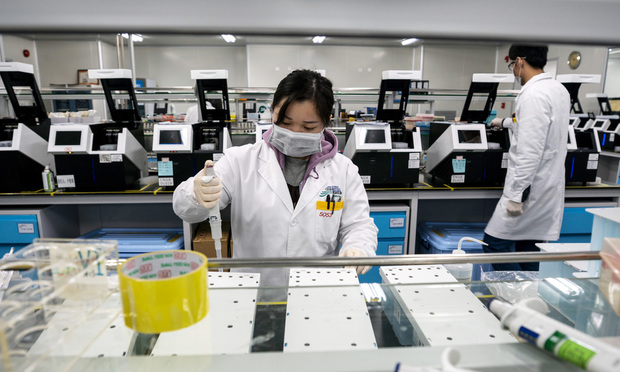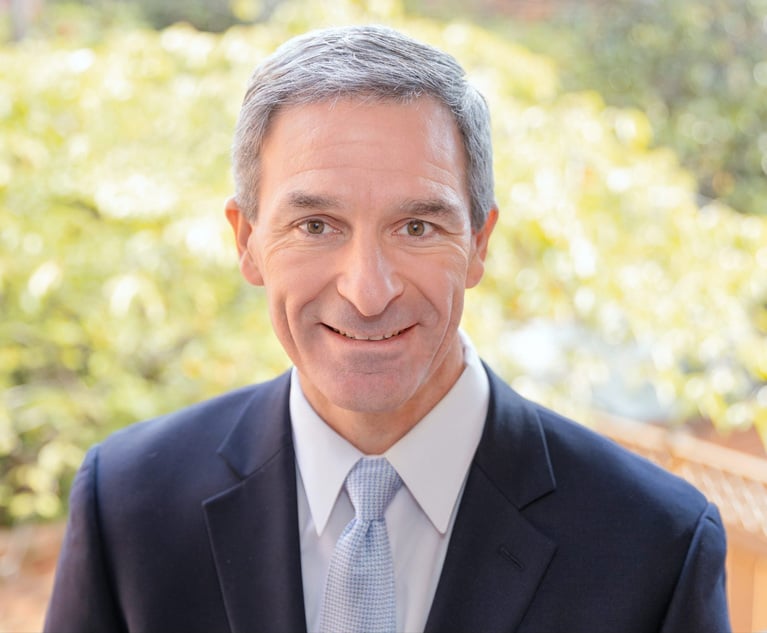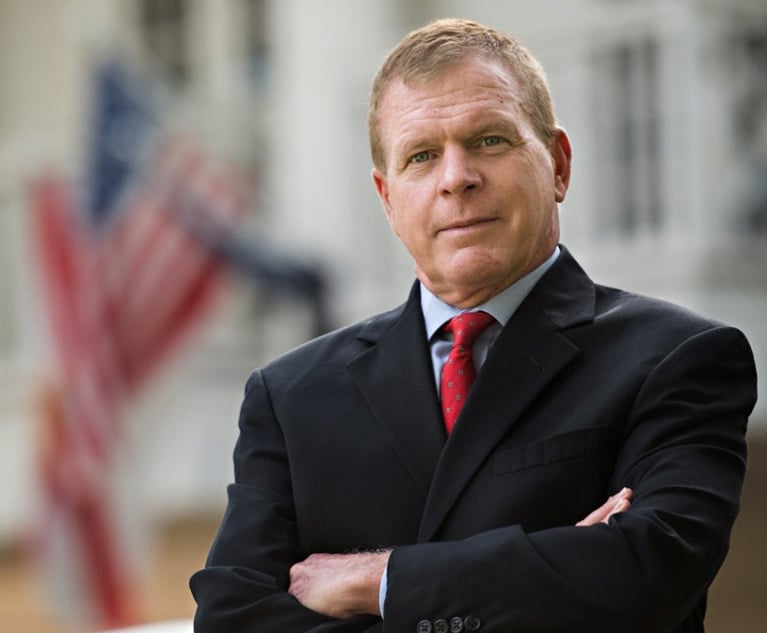'Foreign Influence' in Research: Science and Security Under the Microscope
While the value of global scientific exchange and the benefits of working across borders and in diverse teams are repeatedly emphasized, concerns about theft of intellectual property and know-how, "double-dipping" in federal grants, and failure to disclose other research support or commitments are mounting.
January 31, 2020 at 10:00 AM
6 minute read
 Chinese national gene bank in Shenzhen, China.
Chinese national gene bank in Shenzhen, China.
U.S. universities and academic medical centers, their faculty, researchers and investigators are facing increasing scrutiny and pressure to address risks that foreign governments, particularly China, are using international research collaborations and awards programs to gain scientific and economic advantage at the expense of U.S. national security and technology interests. Funding agencies, such as the National Institutes of Health and the National Science Foundation, are united with congressional leaders, the Department of Defense and the FBI, among others, in asserting that the American research enterprise itself is under threat from foreign actors.
Real-life examples are multiplying. In December 2019, the U.S. Department of Justice announced an unusual, $5.5 million False Claims Act settlement with the Van Andel Research Institute, for two researchers' failure to disclose to National Institutes of Health their foreign affiliations and foreign research support. Last summer, in United States v. Tao, a University of Kansas researcher was charged with mail and wire fraud for failing to report to KU his talent program employment agreement with a China-based university. Funded at least in part by research grants from NSF and Department of Energy, the researcher allegedly defrauded these U.S. agencies regarding sources of his research support and his affiliations; the case demonstrates the government's commitment to using unusual strategies to prosecute possible misconduct in this context. Other federal criminal prosecutions have followed, including one relating to attempted unauthorized air transport of human biospecimens to China, and others relating to investigators' dissembling to federal investigators when being questioned about their China ties and China-sourced personal income.
While there is huge value in global scientific exchange, concerns are mounting about theft of intellectual property and know-how, "double-dipping" in federal grants, and failure to disclose other research support or commitments, such as "shadow" research operations in China. A Senate investigation report issued on Nov. 18, "Threats to the U.S. Research Enterprise: China's Talent Recruitment Plans," highlights that many of these activities have occurred without disclosure to U.S. university employers or funders, and often with specific conditions that the faculty and researchers involved not disclose these China-related activities to their own U.S. employers.
For the past decade, China has promoted "talents" and other affiliation programs, with their monetary awards and research funding, to persuade U.S. researchers to engage in collaboration, teaching and other activities in China and to share their knowledge and skills to enable China to grow its research capacity. In principle, the U.S. government has long encouraged such international scientific exchange. Indeed, at a hearing before the Homeland Security and Governmental Affairs Committee's Permanent Subcommittee on Investigation following the release of the Senate report, committee chairman Robert Portman recognized that the conduct creating risk is "not always about legal or illegal" activity so much as it is about activity that calls into question the integrity of the federal research funding enterprise.
Problems arise when these relationships are not disclosed appropriately in grant applications or progress reporting, or when they include conditions that are at odds with U.S. agency or employer commitments. For example, many Chinese talent program participants agree to work "full time" or for significant percentages of the year in China or with their Chinese university partner when, in fact, they have no intent to, and often do not, undertake such work because they have other commitments under U.S. grants. When investigators nevertheless agree to these conditions, and fail to disclose them to funders such as the NIH, they may be violating grant requirements in violation of civil and criminal law.
In 2018, NIH began asking its awardees to investigate individual investigators involved in these China-related activities. NIH has opened inquiries into more than 200 investigators as of late 2019. In a December 2019 public meeting of the NIH's Advisory Committee to the Director, the NIH deputy director for extramural research, Michael Lauer, reported that NIH has contacted more than 70 institutions and undertaken an "in-depth" look at over 140 scientists. Of these, he reported, 75% have "a real problem" and present a "substantial" compliance concern. Numerous researchers affiliated with talent programs have been terminated or reassigned following confidential discussions between NIH and their U.S. academic employers.
This changing landscape may portend fundamental shifts in how federal research awardees must disclose possible financial conflicts of interest, conflicts of commitment and foreign activities. The Senate report criticized the inconsistency of disclosure processes across all federal funders, including for reporting individual investigators' outside activities and commitments, and called for harmonization. NIH and NSF witnesses at the Senate hearing committed to seeking harmony in reporting requirements.
Reflecting at the conclusion of the Senate hearing, Rebecca Keiser, head of the NSF's Office of International Science and Engineering, observed that the Chinese talent programs represent "a new kind of threat" for which an ongoing process of assessment may be needed as China's tactics evolve in response to heightened attention from U.S. authorities. The hearing represented a call to reorient the conversation away from risk and compliance to focus more on values and ethics. Congressional participants promised to "assist with appropriate [new] legislation" to address the concerns, meaning that regulatory change may be on the horizon. Many institutions are already well into the process of internal engagement to identify problems and develop solutions.
It is unclear how this issue will unfold, but for reasons of national security and national economic interests, changes are coming in the relationship between the U.S. government and the scientific apparatus of our universities and medical centers. To prevent intellectual property "leakage" to foreign entities and governments, tougher, more rigorous U.S government oversight of research in academia, medicine and industry seems to be imminent.
Valerie Bonham is counsel and Mark Barnes is a partner in Ropes & Gray's health care and life sciences regulatory & compliance practices.
This content has been archived. It is available through our partners, LexisNexis® and Bloomberg Law.
To view this content, please continue to their sites.
Not a Lexis Subscriber?
Subscribe Now
Not a Bloomberg Law Subscriber?
Subscribe Now
NOT FOR REPRINT
© 2025 ALM Global, LLC, All Rights Reserved. Request academic re-use from www.copyright.com. All other uses, submit a request to [email protected]. For more information visit Asset & Logo Licensing.
You Might Like
View All


Restoring Antitrust: Returning to the Consumer Welfare Standard
Trending Stories
- 1Florida Bar Sues Miami Attorney for Frivolous Lawsuits
- 2Donald Trump Serves Only De Facto and Not De Jure: A Status That Voids His Acts Usurping the Power of Congress or the Courts
- 3Georgia Hacker Pleads Guilty in SEC X Account Scam That Moved Markets
- 4Trump's Pick for SEC Chair Likely to Stymie Shareholder Proposals from ESG Advocates
- 5Adobe’s Chief Cyber Legal & Privacy Officer Talks Managing Gen AI Risks, Cyber Training
Who Got The Work
J. Brugh Lower of Gibbons has entered an appearance for industrial equipment supplier Devco Corporation in a pending trademark infringement lawsuit. The suit, accusing the defendant of selling knock-off Graco products, was filed Dec. 18 in New Jersey District Court by Rivkin Radler on behalf of Graco Inc. and Graco Minnesota. The case, assigned to U.S. District Judge Zahid N. Quraishi, is 3:24-cv-11294, Graco Inc. et al v. Devco Corporation.
Who Got The Work
Rebecca Maller-Stein and Kent A. Yalowitz of Arnold & Porter Kaye Scholer have entered their appearances for Hanaco Venture Capital and its executives, Lior Prosor and David Frankel, in a pending securities lawsuit. The action, filed on Dec. 24 in New York Southern District Court by Zell, Aron & Co. on behalf of Goldeneye Advisors, accuses the defendants of negligently and fraudulently managing the plaintiff's $1 million investment. The case, assigned to U.S. District Judge Vernon S. Broderick, is 1:24-cv-09918, Goldeneye Advisors, LLC v. Hanaco Venture Capital, Ltd. et al.
Who Got The Work
Attorneys from A&O Shearman has stepped in as defense counsel for Toronto-Dominion Bank and other defendants in a pending securities class action. The suit, filed Dec. 11 in New York Southern District Court by Bleichmar Fonti & Auld, accuses the defendants of concealing the bank's 'pervasive' deficiencies in regards to its compliance with the Bank Secrecy Act and the quality of its anti-money laundering controls. The case, assigned to U.S. District Judge Arun Subramanian, is 1:24-cv-09445, Gonzalez v. The Toronto-Dominion Bank et al.
Who Got The Work
Crown Castle International, a Pennsylvania company providing shared communications infrastructure, has turned to Luke D. Wolf of Gordon Rees Scully Mansukhani to fend off a pending breach-of-contract lawsuit. The court action, filed Nov. 25 in Michigan Eastern District Court by Hooper Hathaway PC on behalf of The Town Residences LLC, accuses Crown Castle of failing to transfer approximately $30,000 in utility payments from T-Mobile in breach of a roof-top lease and assignment agreement. The case, assigned to U.S. District Judge Susan K. Declercq, is 2:24-cv-13131, The Town Residences LLC v. T-Mobile US, Inc. et al.
Who Got The Work
Wilfred P. Coronato and Daniel M. Schwartz of McCarter & English have stepped in as defense counsel to Electrolux Home Products Inc. in a pending product liability lawsuit. The court action, filed Nov. 26 in New York Eastern District Court by Poulos Lopiccolo PC and Nagel Rice LLP on behalf of David Stern, alleges that the defendant's refrigerators’ drawers and shelving repeatedly break and fall apart within months after purchase. The case, assigned to U.S. District Judge Joan M. Azrack, is 2:24-cv-08204, Stern v. Electrolux Home Products, Inc.
Featured Firms
Law Offices of Gary Martin Hays & Associates, P.C.
(470) 294-1674
Law Offices of Mark E. Salomone
(857) 444-6468
Smith & Hassler
(713) 739-1250









